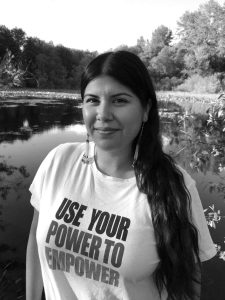THOUGHTS ON THE THEME
When we first thought of the theme for the July issue, we were thinking about Malcolm X’s declaration that 1964 “would be the year of the ballot or the bullet.”
He meant that in the absence of meaningful electoral choices open to black voters informed as to what the ballot is supposed to produce, their frustrations would generate a powder keg—a bullet—ready to go off. But Malcolm was an optimist. It was the ‘60s, when the anti-war movement and the civil rights movement had real supporters in Congress, and there was hope that the US would enter a period of reconstruction. Malcolm observed that, “when white people are evenly divided, and black people have a bloc of votes of their own, it is left up to them to determine who’s going to sit in the White House and who’s going to be in the dog house.”
That’s not what it looks like today. Republicans, especially, are of the same persuasion as Malcolm: black voters could change the outcome of an election.
So we’re confronted with a very different meaning of the ballot or the bullet. A substantial segment of the ruling class is unwilling to chance an election where everyone can vote. Now, it appears that in the presence of meaningful elections accessible to all, the elites encouraged militias that threatened the 2020 election results; a threat that hangs over us even as their Republican allies work to torpedo democracy by steadily making it harder and harder for black people to cast a vote. And by extension, making it harder for everyone else who can’t get through the obstacle courses they are setting up.
Ease of voting in Washington State goes hand-in-hand with election integrity—protected by a commitment to educate voters and election officials, and to open all aspects of the electoral process to scrutiny. Check out the website of our Secretary of State, Kim Wyman (a Republican) for a guided tour of security arrangements, signature verification, how to be a voter, how to run for office—backed up by easy-to-read data on everything else related to voting. http://www.sos.wa.gov/elections/. In 17 other states, Republican legislators have enacted a host of new laws to restrict voters’ access to the ballot. In the meantime, it has to be acknowledged that throughout the summer of 2020 and leading up to the general election, militias and other armed groups intervened in protests, plotted to kidnap the Governor of Michigan, threatened election officials, and stormed the capital.
The possibility that this threat will manifest itself in the elections coming in 2022 and 2024 can’t be discounted. What happened here in 2020-21 was unthinkable a few years ago. But the existence of formal electoral arrangements no longer serves as a guarantor of legitimacy for a government. Around the world, voting coexists with violence—pro-state militias target supporters of opposition parties; the state calls on security forces to suppress dissidents.
There are other aspects of our electoral system that contradict its claim to be a functioning democracy that serves all of its people. Campaigns are financed by the wealthiest and their corporate interests. Ilana Smith’s story tells how Thurston County Democrats are challenging this by deciding not to endorse candidates who accept corporate funds. A similar dynamic exists when we look at the amount of resources that the leaders of our country devote to military weapons and war. The article about Trident submarines and the continuing “modernization” of our nuclear weaponry describes the extraordinary power that the directors of military corporations have over our local and national politicians—voting notwithstanding.
Our segregated cities and unequally funded schools contribute to disenfranchisement of people by defining them out of “the mainstream.” Our interview with North Thurston school teacher Christine Yorba is a thoughtful picture of how difficult it is to transcend the racism embedded in our institutions.
Finally, take a look at another way voting produces unanticipated consequences. A new bill pending in Congress would offer some of the nearly 10 million “unauthorized” immigrants who have lived and worked for years in the US a way to gain legal status—admittedly after a slow and bureaucratically fraught process. Seemingly a straightforward acknowledgement of reality.
Such proposed legislation would have no hope of getting enough Republican votes to pass. So the bill includes a trade-off in favor of grower interests. Republicans, including Washington Rep. Dan Newhouse, a Yakima Valley grower, added provisions to increase the number of “guest workers” growers can bring in just for the season, and to weaken requirements otherwise applicable to pay and working conditions. David Bacon’s article tells the full story and the consequences for Washington’s “guest workers.”
—bw
Upcoming themes
-
August 2021: How things change; how they don’t change; whether we can even tell. Deadline July 15.
-
September 2021: Back to school. In every way you can think of.
Deadline Aug 15.
About the cover
In late May, artist Kathy Gore-Fuss brought to fruition an idea that had been building in her mind for months—an outdoor art installation addressing the physical and emotional losses of the pandemic. Gore-Fuss and other artists wrapped thousands of flowers on to the surface of a large stone sculpture (by local artist Boucante, who also donated the use of his NE Olympia yard), creating a bower-like space with flower garlands that hung from trees and defined the space around the incense-topped stone. A blank journal allowed visitors to transcribe their thoughts while sitting on a nearby bench. As intended, A Place to Mourn acted as witness and recorder of collective and personal loss and grief, initiation and transformation. Gore-Fuss invited poet Ashly McBunch to visit the site (a copy of the poem they wrote in response to the site is on page 3). Inspired by the community’s enthusiastic response, Gore-Fuss plans to create more temporary art installations in the future.

Be First to Comment